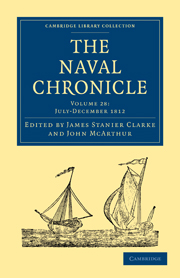 The Naval Chronicle
The Naval Chronicle Published online by Cambridge University Press: 10 January 2011
“Peace to each manly Soul that sleepeth!
Rest to each faithful eye that weepeth!
Long may the fair and brave
Sigh o'er the Hero's grave.”
(Anacreon Moore.)The friends of this distinguished officer and excellent man, have, in justice to his professional merit, determined, that a memoir of his public services should thus be given to his country: Lest it should be said of him, as Johnson once asserted of a most distinguished character, “His contemporaries, however they reverenced his genius, left his life unwritten; and nothing, therefore, can be known, beyond what casual mention and uncertain tradition have supplied.”
Mr. John Stewart, the second son of William Stewart, Esq. of Castle Stewart, in the shire of Galloway in Scotland, was born on the 21st of December, 1774. His mother was the sixth daughter of Lord Fortrose; to whose eldest son the title of Earl of Seaforth was restored, which had been forfeited in the year 1715.
Mr. Stewart was educated in Scotland until the year 1788: when, shewing an inclination for the sea service, he was sent to the Naval Academy, at New Cross, Deptford, where his attention to the scientific objects of his profession was conspicuous. During the ensuing year (1789), he embarked as a midshipman on board the Rose frigate, Captain Waller, on the 9th of May, 1789; but availed himself of an opportunity of returning to his academy, which had been removed to Eltham, while the Rose was in port.
To save this book to your Kindle, first ensure [email protected] is added to your Approved Personal Document E-mail List under your Personal Document Settings on the Manage Your Content and Devices page of your Amazon account. Then enter the ‘name’ part of your Kindle email address below. Find out more about saving to your Kindle.
Note you can select to save to either the @free.kindle.com or @kindle.com variations. ‘@free.kindle.com’ emails are free but can only be saved to your device when it is connected to wi-fi. ‘@kindle.com’ emails can be delivered even when you are not connected to wi-fi, but note that service fees apply.
Find out more about the Kindle Personal Document Service.
To save content items to your account, please confirm that you agree to abide by our usage policies. If this is the first time you use this feature, you will be asked to authorise Cambridge Core to connect with your account. Find out more about saving content to Dropbox.
To save content items to your account, please confirm that you agree to abide by our usage policies. If this is the first time you use this feature, you will be asked to authorise Cambridge Core to connect with your account. Find out more about saving content to Google Drive.